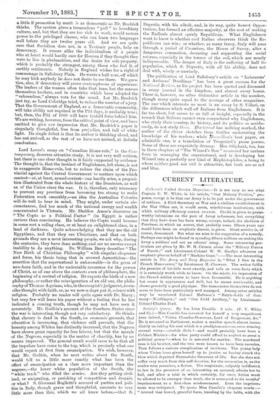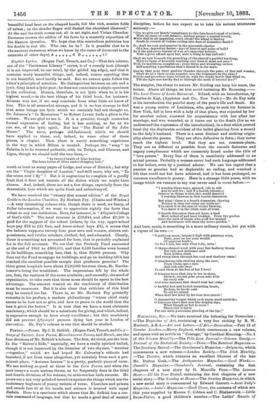hero indeed, "Vivian Chandos-Devereux, Lord of Bongomont, (Ito."
lie is returned to Parliament, makes a maiden speech almost imme- diately on taking his seat which is a prodigious success, even winning several votes—mirabile dictu !—and would probably have been a Cabinet Minister—for what party conld afford to neglect so great a political power ?—when he is arrested for murder. Tho murdered
man is his brother, and the two were known to have been enemies.
Then follows a carious complication of incidents. The young lady whom Vivian loves gives herself up to justice, as having struck the blow which deprived Marmaduke Devereux of life. But she does not
suffer very much from this self-devotion, for the accusation is, as the reader soon perceives, a fiction. The magistrate, culpably indifferent to law in the presence of so interesting an accused, admits her to bail, and after a trial in which certainly, for once, fiction must be allowed to be stranger than truth, she is sentenced to six months' imprisonment as a first-class misdemeanant. Even the imprison. ment was -mitigated. To quote Miss Cassilies eloquent words :— " Around that bowed, graceful form, kneeling by the table, with the beautiful head bent on the clasped hands, fell the rich, sombre folds of velvet ; on the slender finger still flashed the cherished diamond." At the end the truth comes out, all is set right, and Vivian Chandos- Devereux crowns the edifice of his fame by a masterly exposition of the Eastern Question. We hope that this marvellous politician has his double in real life. Who can he be ? Is it possible that he is the eminent statesman whom we know by the name of (to revert to the asterisks of other days) A*****d B******t?



































 Previous page
Previous page